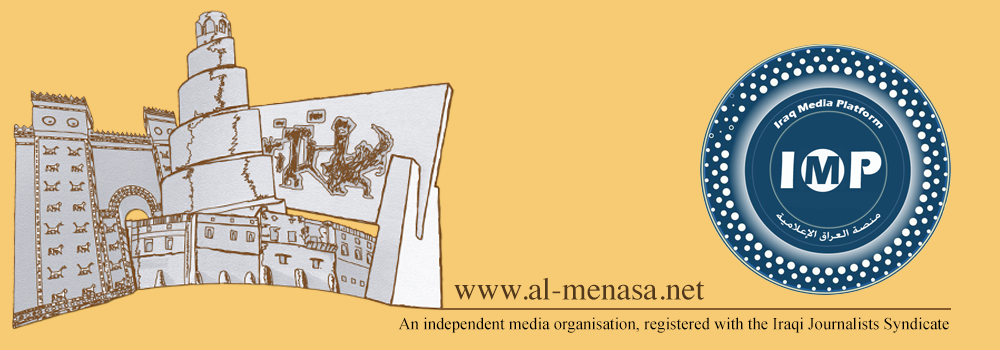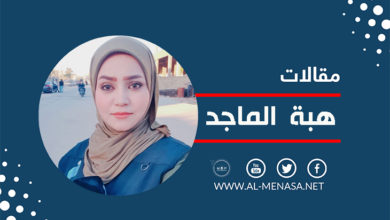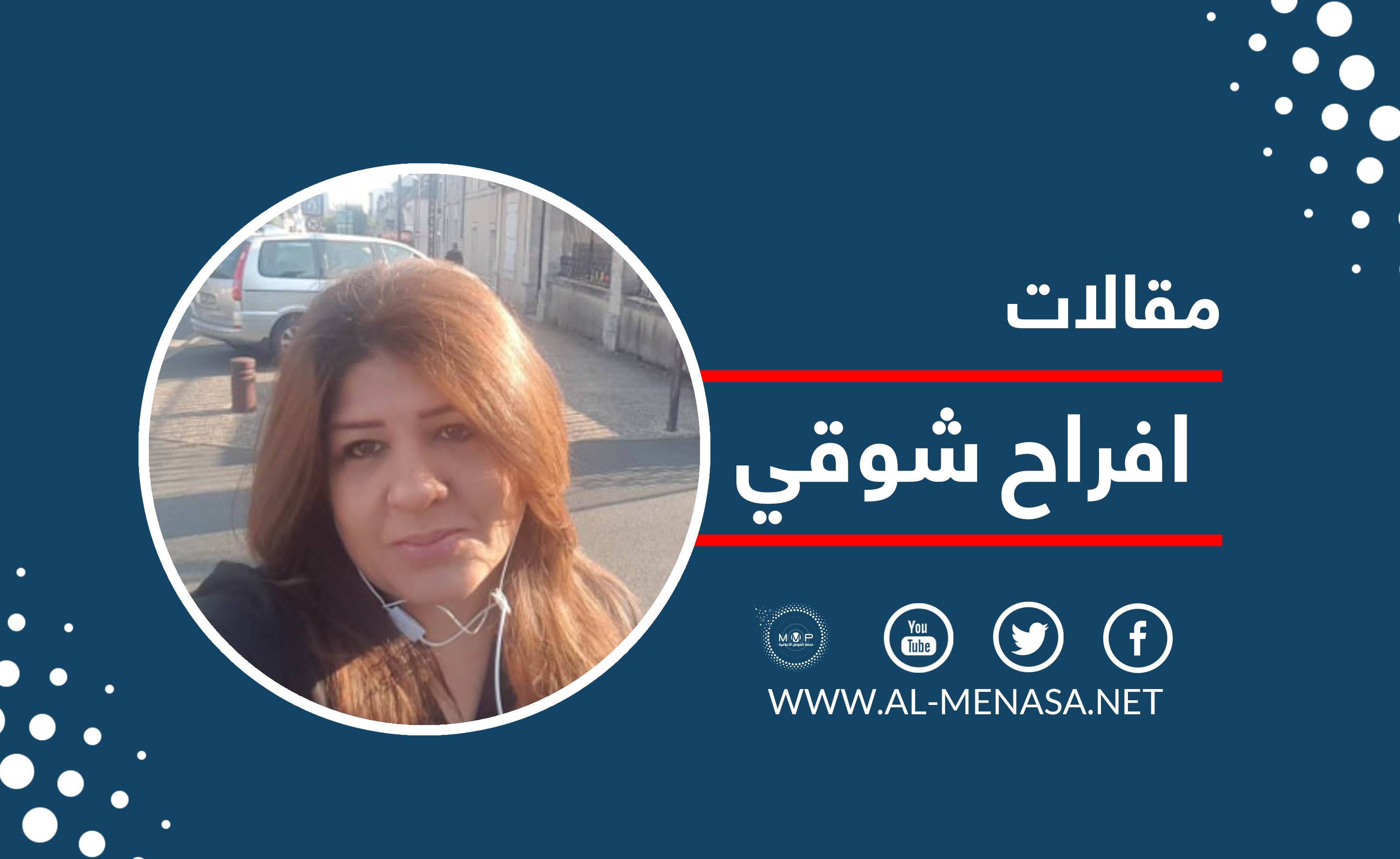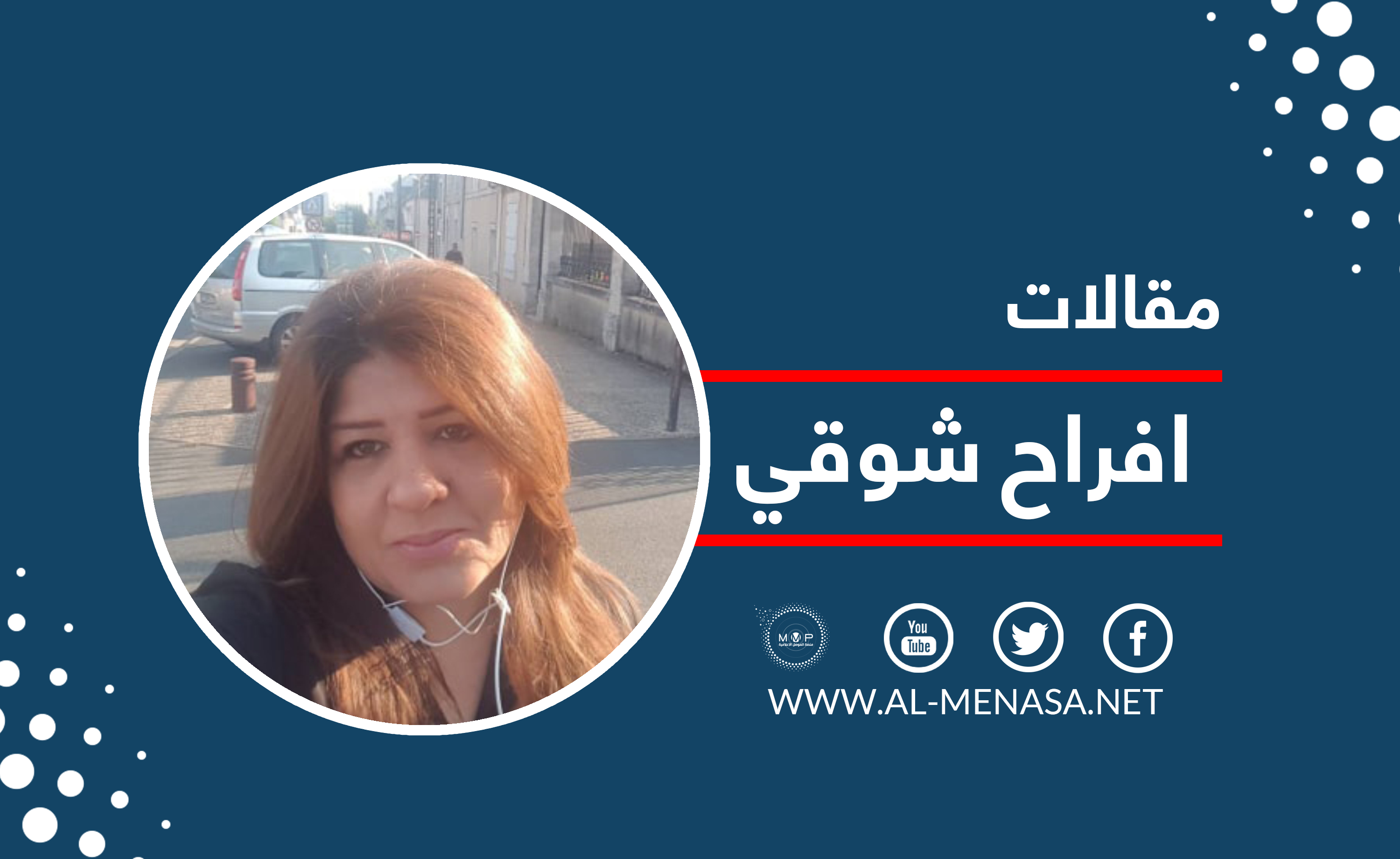Women from Nineveh .. labor in the heart of displacement

She calls on her daughter to fetch and pour water for kneading the clay and put it on a ring completing her work just before we arrived. She is working on making her own clay oven in a camp where no one has been doing anything but eating and sleeping for more than a year.
“I spend two full days to the manufacture one clay oven and I sell each one for five thousand Iraqi Dinars ( equal to only $ 4 USD),” says Umm Ahmed, while wiping her muddy hands.
Hassan Sham camp is one of the three camps beside the camps of Khazr and Jamkur. It is located east of Mosul and was set up in the initial phases of military operations in October 2016.
Umm Ahmed is only one of the thousands of the displaced people from Nineveh who lives in Hassan Sham camp in a condition similar to house arrest and or forced and concentration camps. They are no allowed to exit and or leave the camp except in emergency conditions. The displaced people in this camp do not have any job and or work and they only rely on aid and assistance offered by International and governmental organizations.
“My work is to make the clay oven on which the displaced people depend on to make their bread. Clay ovens do not need electricity, gas or oil. However, it is not worth the effort and the hard work exerted by me and my daughters, but I need to be able to support my family,” Umm Ahmed said, while she is digging the mud, kneading and polishing the clay very well.
The raw materials needed to make a clay oven are available in the camp. These materials consists of mud, water, salt and some hay (it is comprised of pulverized wheat stalks or barley) as Umm Ahmed explained it for us.
The camp of the IDPs stretches to a large swam of area in the village of Hassan Sham. This camp comprises of four other camps, which was expanded during the fighting in December 2016 and July 2017. As the numbers if IDPs increased this led to the opening of another camp in the village of Jamkur,
In Khazir also there are some small shops and working places. Inside the camp there are dozens of small shops and businesses opened by women, especially by widows who are selling basics stuff like food and some children’s sweets and confectionary. These women do not have any monthly income nor any social welfare provided for them.

Umm Mohammed is also another IDP from the camp. She is a widowed mother of a widow and are from Musheirfa area, northwest of Mosul. Umm Mohammed and other widows of the camp seek to defend the rights of women who have lost their homes. These women have forgotten the notion of one day returning to their city because they have lost their husbands in the fighting with ISIS.
“My husband was killed during the displacement. We buried him on the road and we went to the camp and since then we have been spending our life here in this camp” Umm Mohammed said this while she was sitting in her sun burned and impoverished tent.
Umm Mohammed now sells bread to make ends meet and to provide the livelihood and the needs of her family and her four children.
“My daughter is another widow like me, despite her young age, we lost our husbands and no one comes here to register us and or care for these women,” she concluded her speech.
According to the statement of the Minister of Displacement and Migration Mr. Jassim Jaf the Ministry of Displacement and Migration has recorded more than 5.5 million displaced people since 2014, while the percentage of returnees has not exceeded 45% so far.
Sewing, knitting, tailoring, and embroidery are the only way of providing a resource of income for the women in the camp. These IDP women sell their products to the other displaced people at a lower prices. However, the money they earn from these works are not adequate to bring a kilogram of meat for their family and their children who have been deprived since the beginning of their displacement and for such a long time.
There are many reasons that prevents these IDPs to return to their newly liberated cities, such as the high cost of living, the high cost of rent and resettlement, the lack of employment opportunities and the lack of government plans to assist a dignified return and reintegrate them into society.





what does viagra do to women how long before sex to take viagra canadian pharmacy viagra 50 mg
cialis prices at walmart order cialis 20mg what\’s better viagra cialis levitra
ivermectin american journal of therapeutics ivermectin bottle oral ivermectin cost
cialis onlilne cheap cialis cialis from india
lilly cialis coupons buy cheapest cialis cialis & viagra
5 mg prednisone daily cost of prednisone 10mg tablets prednisone 20 mg pill
prednisone 10mg prices iv prednisone can i buy prednisone from canada without a script
buy prednisone online india prednisone 10mg canada buy prednisone without rx
clomid generic clomid tablet price india clomid 50mg price
doxycycline 100mg tablets nz buy doxycycline over the counter uk doxycycline 100mg without prescription
causes for ed levitra without a doctor prescription male dysfunction pills
clomid rx online buy generic clomid online clomid online fast delivery
medicines for ed drugs prices drug prices
ed devices ed tablets diabetes and ed
natural ed drugs pills for erection non prescription ed pills
male dysfunction treatment ed treatment review ed medicine
buy ed drugs online medication online top ed pills
where to buy prednisone 20mg no prescription prednisone buy cheap prednisone best prices
ed drugs ed causes and treatment non prescription ed drugs
cialis for sale brand cialis no prescription needed buy cialis brand
ivermectin dose scabies stromectol usa
homeopathic remedies for ed erectile dysfunction medicines buy cheap prescription drugs online
indian cialis cheapest cialis usa cialis experience forum
can i buy prednisone online without a prescription where can you buy prednisone prednisone 10
stromectol in Canada stromectol without prescription durvet ivermectin pour on for cattle
ivermectin over the counter canada is pyrantel pamoate the same as ivermectin oral ivermectin for chickens
pastillas cialis cialis black to buy in the uk generic cialis soft tabs 20mg
doctors who prescribe ivermectin online how long does ivermectin toxicity last in dogs ivermectin covid uptodate
propecia online pharmacy cheap propecia finasteride 1mg
medicine for impotence ed pills otc best ed drugs
ed treatment review medicine erectile dysfunction ed drug prices
propecia without a doctor prescription drug finasteride propecia 5mg for sale
the best ed pill cheap erectile dysfunction pills online best ed pills at gnc
erection pills that work erection pills cheap erectile dysfunction
cheapest ed pills online top ed drugs erectile dysfunction drug
medicine erectile dysfunction medicine erectile dysfunction erection pills online
generic drugs without doctor’s prescription highest rated canadian pharmacies internet pharmacy no prior prescription
ed medication online buy ed pills erectile dysfunction drug
stromectol 12 mg tablets stromectol 12 mg tablets stromectol for sale
buy clomid 50mg online buy clomid 50mg buy clomid
tadalafil cialis pills tadalafil 10mg price
sildenafil 100 mg sildenafil citrate tablets 100 mg sildenafil citrate tablets 100 mg
stromectol for sale stromectol price usa stromectol pills for humans
clomid tablets buy clomid buy clomid
stromectol 12 mg tablets stromectol for sale stromectol for sale
stromectol for humans for sale stromectol tablets for humans where to buy stromectol
stromectol 12 mg tablets stromectol for humans for sale stromectol for humans for sale
viagra over the counter walmart viagra pills where can i buy viagra over the counter
buy generic 100mg viagra online viagra price buy real viagra online
cialis manufacturer cialis generic best price that accepts mastercard buy daily cialis from canada
cialis shop online tadalafil without a doctor’s prescription cialis usa
shop for cialis tadalafil viagra levitra cialis offers
cialis 20 mg price walmart cialis cialis generico
buy brand cialis online usa tadalafil buy generic cialiss
cheap cialis generic online buy tadalafil cialis men
how many years can you take cialis? tadalafil without a doctor’s prescription cialis samples
how to learn critical thinking
creative and critical thinking
is communication a critical thinking skill
define dissertation
tips for writing dissertation
online dissertation help veroffentlichen
doctoral dissertation help qualitative
dissertation help online
doctoral dissertation help reference
uk dissertation writing help online
dissertation abstracts international
how long should a dissertation be lse
write your dissertation
help with dissertation
chicago illinois dissertation help
free welcome bonus
free bonus casino
online casino usa
data analysis dissertation help
uf dissertation format
dissertation meaning
write my dissertation for me
dissertation review
dissertation title examples
online us casinos
online casinos usa
online casino real money
thesis dissertation
search writing help
doctoral dissertation help usa
mobile casinos
free bonus no deposit
win real money online casino for free
dissertation writing process
dissertation help
dissertation proposal writing
casino online real money
free welcome bonus no deposit
online casinos for usa players
writing a proposal for your dissertation
phd dissertation editing help
dissertation acknowledgements
online casino play for real money
casino sign up bonus no deposit
usa casinos on line
casino online real money
online casino bonuses
real money casino online
best deposit casino bonus
online casinos for real money
win money online
online bingo real money
mobile casino online
free no deposit bonus
online gambling real money
online casinos no deposit
casino no deposit free bonus
online casino free bonus no deposit
real online casino
casino usa online
bingo online for money
online usa casino
welcome bonus no deposit
best free vpn for firestick
best vpn reddit
best budget vpn
casino free money
usa casino
free casino bonus no deposit
pcmag best vpn
trust.zone vpn
best countries for vpn
casinos sites
blackjack payout
blackjack online real money
buy vpn account
free vpn server list
express vpn download
online gambling real money
live online casino usa
casino free spins
free india vpn
avast secureline vpn buy
what is a vpn connection
real casino online
best online casinos usa
online casino win real money
free vpn browser
free vpn firefox
vpn browser free
whats the best free vpn
where to buy vpn
vpn online free
online usa casino
online bingo for money
betonline casino
business class vpn
free fast vpn
best free vpn for macbook
online casinos no deposit
online blackjack for real money
casino sites
windscribe free vpn
free web vpn
best vpn 2022
buy hidemyass vpn
turbo vpn
best free vpn
A round of applause for your blog.Really thank you! Great.
top online casinos usa
online casino game real money
betonline casino
online real money casino
free sign up bonus
free welcome bonus no deposit required
gay dating rules for making the first movie
free gay dating
manhunt gay dating site website
manhunt gay dating
most famous gay dating site
gay dating advice forums
best date online
internet dating sites
sexy dating apps
dating gay costa rican
fat chub gay dating
gay senior dating
adult singles
good dating site
tinder online
single date online
a free dating site
100% free dating site in europe
best dating website
tender dating site
best single sites
the best free gay hookup and dating sites
gay conservative dating
gay hairy men dating sites
free online go
meet singles online
best single sites
superchub gay dating
gay white men dating black men
gay dating apps for windows 10
online dating personals
date online
italian dating sites
gay tips for gay bottom dating
gay men dating site
gay gamer dating sites
online dating site crossword
meet single women
meet single women online
bonus casino no deposit
no deposit bonus casinos
casinos online usa
singles chat
absolutely free local dating site
best online dating and chatrooms travel
biggest online casino bonuses
online casino signup bonus no deposit
casino welcome bonus no deposit
what does the diamond emoji mean in gay chat
random gay chat with a stranger
gay chat app for android
video boy randon gay chat
gay chat boys
free gay phone chat line
free gay phone chat line
fre gay chat
free bi-gay chat lines
chat avenue gay chat
chat avenue gay chat room
gay chat phoenix
gay universe man chat
gay college chat rooms no cam needed
western pa gay chat
live gay chat room
chat avenue gay chat
gay sex chat free
open gay chat rooms
gay chat phone numbers
chat random gay
gay live chat rochester
black bottom gay chat
anonymous gay cam chat
gay ky chat rooms
gay chat phone numbers
kik chat gay penis
gay sex massachusetts chat
gay men snap chat
gay teen boy veido chat
gay web cam chat room
gay tranny webcam chat
cleveland gay chat
chat ave gay chat
gay advise chat
gay chat webcam
gay chat rout
ring central gay chat rooms
bing gay chat rooms
best internet dating websites
meetme dating site
tinder dating
usa free dating sites
match single
date chatting sites
which online dating site is best?
free app for online meeting
free dating sites for single men and women
dating simulator dating lucy
free dating site chatting
senior dating sites free
mature dating sites free no credit card fees
single site web
meet singles for free
essays service
english literature essay help
someone write my essay for me
best essays
essay writing service review
college essay editing services
custom essay writing sites
best essay writing service review
online help with essay writing
essay writing services recommendations
essay conclusion help
please write my essay for me
help for essay writing
persuasive essay writer
help me write an essay
essay writing services reviews
cheap essay service
argumentative essay help
personal essay help
best writing paper
essay writers for hire
buy a essay
need someone to write my essay
essay writer generator
buy college essays online
essay writing service recommendation
essay help 123
help with an essay
write my essay service
college essay writers block
professional essay writing help
college essay online help
custom essays toronto
help me to write an essay
write my essay for money
customized essays
best writing paper
cheap essay writer
writing essays custom
cheap essay help
mba essay services
essay writing service scams
academic essay service
essay review service
buy essay papers online
essay on helping poor people
help writing a narrative essay
best essays writing service
cheap custom essay
custom college essay writing service
buy custom essays online
essay editing service reviews
help writing scholarship essays
best websites for essays
cheapest custom essay writing
usa essay writing services
professional essay writing help
professional essay writing help
essay writing services usa
essay service cheap
essay writers net
essay writing service scam
automatic essay writer
customer essay
help writing a comparison and contrast essay
essay writing service toronto
what is the best college essay editing service
what are good essay writing services
college essay help long island
online essay writing help
legit essay writing services
buying essays
custom made essays
custom essay writing service org
write my essays
college application essay help
business school essay writing service
help to write an essay
essay help forum
top rated essay writing websites
help writing essays
need help writing a essay
the best custom essay writing service
essay help service
essay conclusion help
custom essays review
professional essay writers
online essay service
law essay help
essay writing company
cheap essay writer
best rated essay writing service
i cant write my essay
need help with essay writing
custom application essay
best essay writer company
help my essay
cheap essay writing service online
custome essay
ivermectin 1 cream 45gm ivermectin – ivermectin brand name
coursework history
coursework science
coursework info